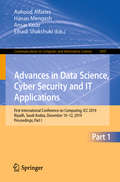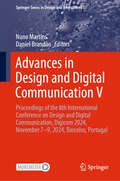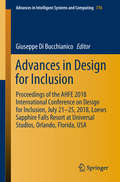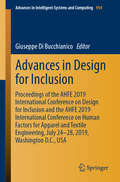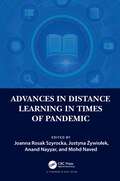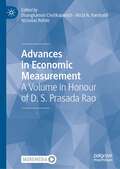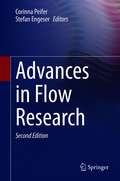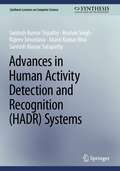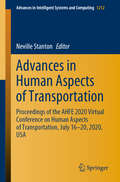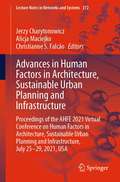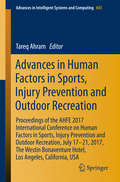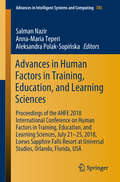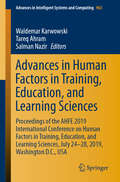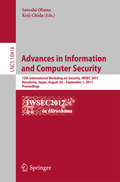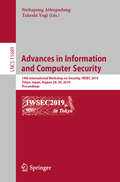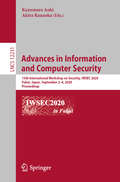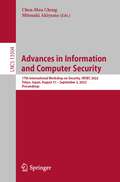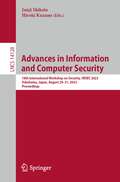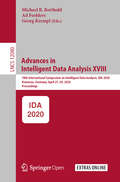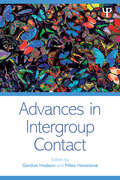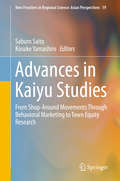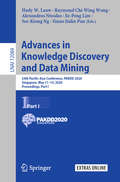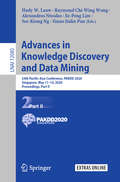- Table View
- List View
Advances in Data Science, Cyber Security and IT Applications: First International Conference on Computing, ICC 2019, Riyadh, Saudi Arabia, December 10–12, 2019, Proceedings, Part I (Communications in Computer and Information Science #1097)
by Elhadi Shakshuki Auhood Alfaries Hanan Mengash Ansar YasarThis book constitutes the refereed proceedings of the First International Conference on Intelligent Cloud Computing, ICC 2019, held in Riyadh, Saudi Arabia, in December 2019. The two-volume set presents 53 full papers, which were carefully reviewed and selected from 174 submissions. The papers are organized in topical sections on Cyber Security; Data Science; Information Technology and Applications; Network and IoT.
Advances in Design and Digital Communication V: Proceedings of the 8th International Conference on Design and Digital Communication, Digicom 2024, November 7–9, 2024, Barcelos, Portugal (Springer Series in Design and Innovation #51)
by Nuno Martins Daniel BrandãoThis book reports on research findings and practical lessons featuring advances in the areas of digital and interaction design, graphic design and branding, design education, society and communication in design practice, and related ones. Gathering the proceedings of the 8th International Conference on Digital Design and Communication, Digicom 2024, held on November 7-9 2024, as a hybrid event, in/from Barcelos, Portugal, this book continues the tradition of the previous ones reporting on new design strategies to foster digital communication within and between the society, institutions and brands. By highlighting innovative ideas and reporting on multidisciplinary projects, it offers a source of inspiration for designers of all kinds, including graphic and web designers, UI, UX and social media designers, and to researchers, advertisers, artists, and brand and corporate communication managers alike.
Advances in Design for Inclusion: Proceedings of the AHFE 2018 International Conference on Design for Inclusion, July 21-25, 2018, Loews Sapphire Falls Resort at Universal Studios, Orlando, Florida, USA (Advances in Intelligent Systems and Computing #776)
by Giuseppe Di BucchianicoThis book addresses a range of topics in design, such as universal design, design for all, digital inclusion, universal usability, and accessibility of technologies for people regardless of their age, financial situation, education, geographic location, culture and language. It especially focuses on accessibility for people with auditory, cognitive, neurological, and visual impairments, ageing populations, and mobility for those with special physical needs. The book explores some of the overlaps between inclusive design and web accessibility to help managers, designers, developers, policy makers, and researchers optimize their efforts in these areas. Based on the AHFE 2018 International Conference on Design for Inclusion, held on July 21–25, 2018, in Orlando, Florida, USA, it discusses new design technologies and highlights the disparate needs of the individuals within a community. Thanks to its multidisciplinary approach, it is a valuable resource for readers from various backgrounds, providing them a timely, practice-oriented guide to design for inclusion.
Advances in Design for Inclusion: Proceedings of the AHFE 2019 International Conference on Design for Inclusion and the AHFE 2019 International Conference on Human Factors for Apparel and Textile Engineering, July 24-28, 2019, Washington D.C., USA (Advances in Intelligent Systems and Computing #954)
by Giuseppe Di BucchianicoThis book addresses a range of topics in design, such as universal design; design for all; digital inclusion; universal usability; and accessibility of technologies regardless of users’ age, financial situation, education, geographic location, culture and language. It especially focuses on accessibility for people with auditory, cognitive, neurological, and visual impairments, ageing populations, and mobility for those with special physical needs. The book explores some of the overlaps between inclusive design and web accessibility to help managers, designers, developers, policy makers, and researchers optimize their efforts in these areas. Based on the AHFE 2019 International Conference on Design for Inclusion, held on July 24-28, held in Washington D.C., USA, it discusses new design technologies and highlights the disparate needs of the individuals within a community. Thanks to its multidisciplinary approach, it provides readers with various backgrounds with a timely, practice-oriented guide to design for inclusion.
Advances in Distance Learning in Times of Pandemic
by Joanna Rosak SzyrockaThe book "Advances in distance learning in times of pandemic" is devoted to the issues and challenges faced by universities in the field of distance learning in covid times. It covers both theoretical and practical aspects connect to distance education. It elaborates issues regarding distance learning, its challenges, assessment by students and their expectations, the use of tools to improve distance learning, and the functioning of e-learning in the industry 4.0 and society 5.0 eras. The book also devotes a lot of space to the issues of Web 3.0 in University e-learning, quality assurance, and knowledge management. The aim and scope of this book is to draw a holistic picture of ongoing online teaching-activities before and during the lockdown period and present the meaning and future of e-learning from students’ points of view, taking into consideration their attitudes and expectations as well as industry 4.0 and society 5.0 aspects. The book presents the approach to distance learning and how it has changed, especially in the time of the pandemic that revolutionized education. Highlights: the function of online education has changed before and in the time of a pandemic e-learning is beneficial in promoting digital citizenship. distance learning characteristic in the era of industry 4.0 and society 5.0 era of industry 4.0 treats distance learning as a desiderable form of education The book covers both scientific and educational aspects and can be useful for University level Under Graduate, Post Graduate and Research Grade courses and can by refeered by anyone interested in exploring the diverse aspects of distance learning.
Advances in Economic Measurement: A Volume in Honour of D. S. Prasada Rao
by Duangkamon Chotikapanich Alicia N. Rambaldi Nicholas RohdeThe purpose of this book is to honour D.S. Prasada Rao and his many outstanding contributions to economic measurement, including index number methods for international comparisons of prices, real incomes, output, and productivity; stochastic approaches to index numbers; purchasing power parities for the measurement of regional and global inequality and poverty; and measurement of income and economic insecurity. This book brings together contributions by well-known and influential researchers in the field of economic measurement with special focus on topics in productivity measurement (Part I); income and health inequality, inequality of opportunity, and measurement of insecurity (Part II); index number theory and applications to consumer price index numbers, international comparisons of prices and real expenditures, and housing price index numbers (Part III). The chapters are authored by eminent researchers including Conchita D’Ambrosio, Bert Balk, Erwin Diewert, Robert Hill, Robert Inklaar, Knox Lovell, Robin Sickles, Jacques Silber and Marcel Timmer. The contributed papers offer in-depth reviews of the state of the art in these areas with a focus on the existing methods and applications, making the volume an invaluable source for both experienced researchers and new researchers, including PhD and other postgraduate students.
Advances in Environmental Psychology: Volume 2: Applications of Personal Control (Advances In Environmental Psychology Ser.)
by Andrew Baum Jerome E. SingerHow do people manage their environments? What processes are basic to the interactions between people and their environments? These questions are central to almost all areas of psychology but in a more narrow sense are the heart of environmental psychology. Some environmental studies focus on the antecedents of person-environment interactions, others on the effects of the environment on the individual, and others on outcomes. Still others focus on the processes by which people attempt to manipulate their surroundings. This volume, the second in a series, is concerned with one of these processes - control, actual and perceived, that individuals exercise over their environment.
Advances in Environmental Psychology: Volume 3: Energy Conservation, Psychological Perspectives (Advances In Environmental Psychology Ser.)
by Andrew Baum Jerome E. SingerFirst published in 1982. Routledge is an imprint of Taylor & Francis, an informa company.
Advances in Flow Research: Revised Second Edition
by Stefan Engeser Corinna PeiferThis second edition provides a review of the current flow research. The first, thoroughly revised and extended, part of the book, addresses basic concepts, correlates, conditions and consequences of flow experience. This includes the developments of the flow model, methods to measure flow, its physiological correlates, personality factors involved in the emergence of flow, social flow, the relationship of flow with performance and wellbeing, but also possible negative consequences of flow. The second, completely new, part of the book addresses flow in diverse contexts, in particular, work, development, sports, music and arts, and human computer interaction. As such, the book provides a broad overview on the current state of flow research – from the basics to specific contexts of application. It presents what has been learned since the beginning of flow research, what is still open, and how the mission to understand and foster flow should continue. The book addresses researchers and students who are interested in flow, as well as practitioners who seek for sound research on flow in their field of expertise.
Advances in Human Activity Detection and Recognition (Synthesis Lectures on Computer Science)
by Akash Kumar Bhoi Rajeev Srivastava Santosh Kumar Tripathy Roshan Singh Santosh Kumar SatapathyThis book provides a comprehensive overview of Human Activity Detection or Recognition (HADR) systems. Detection or recognition of human activities is a prominent research area in the fields of computer vision and artificial intelligence because of its many applications in daily life, including monitoring in public transport areas, health monitoring, anomaly detection in traffic, and smart homes. This book divides different activities according to their criticality, then discusses the various motivations and challenges that are involved in HADR systems. The authors then propose a framework for activity detection or recognition. The book also covers ten key applications of HADR systems and the recent developments for each of them. The authors also propose areas for future research.
Advances in Human Aspects of Transportation: Proceedings of the AHFE 2020 Virtual Conference on Human Aspects of Transportation, July 16-20, 2020, USA (Advances in Intelligent Systems and Computing #1212)
by Neville StantonThis book discusses the latest advances in the research and development, design, operation, and analysis of transportation systems and their corresponding infrastructures. It presents both theories and case studies on road and rail, aviation, and maritime transportation. Further, it covers a wealth of topics, from accident analysis, intelligent vehicle control, and human-error and safety issues to next-generation transportation systems, model-based design methods, simulation and training techniques, and many more. Special emphasis is placed on smart technologies and automation in transport, as well as the user-centered, ergonomic, and sustainable design of transportation systems. The book, which is based on the AHFE 2020 Virtual Conference on Human Aspects of Transportation, held on July 16–20, 2020, mainly addresses the needs of transportation system designers, industrial designers, human–computer interaction researchers, civil and control engineers, as well as vehicle system engineers. Moreover, it represents a timely source of information for transportation policy-makers and social scientists whose work involves traffic safety, management, and sustainability issues in transport.
Advances in Human Factors in Architecture, Sustainable Urban Planning and Infrastructure: Proceedings of the AHFE 2021 Virtual Conference on Human Factors in Architecture, Sustainable Urban Planning and Infrastructure, July 25-29, 2021, USA (Lecture Notes in Networks and Systems #272)
by Jerzy Charytonowicz Christianne S. Falcão Alicja MaciejkoThis book presents human factors research focused on achieving and assessing sustainability in the built environment and architecture. It reports on advanced engineering methods for architecture and design, and on assessments of the social, environmental, and economic impacts of various designs and projects. The book covers a broad range of practical studies relating to ergonomic design and assessment of public and private places, urban ecological constructions, and urban planning for smart city. Further topics include green area planning, environmentally-responsive architecture, and conservation and adaptation of vernacular architectures in modern design. Based on the AHFE 2021 Conference on Human Factors in Architecture, Sustainable Urban Planning and Infrastructure, held virtually on 25–29 July, 2021, from USA, this book offers a wealth of perspectives on sustainability and ergonomics in architecture and urban planning. As such, it represents a timely source of inspiration for designers, architects, urban planners, as well as civil and environmental engineers, and other professionals, including policy-makers, involved in the development of sustainable buildings and infrastructure.
Advances in Human Factors in Sports, Injury Prevention and Outdoor Recreation: Proceedings of the AHFE 2017 International Conference on Human Factors in Sports, Injury Prevention and Outdoor Recreation, July 17-21, 2017, The Westin Bonaventure Hotel, Los Angeles, California, USA (Advances in Intelligent Systems and Computing #603)
by Tareq AhramThis book describes cutting-edge applications of human factors for sports, injury prevention and outdoor recreation disciplines and provide practical guidance on a range of methods for describing, representing, and evaluating human, team, and system performance in various domains. Contributions in this book show how various human factors methods, applied historically in the complex safety critical domains, are suited to describing and understanding sports performance and sports injury prevention. The book discusses a wealth of methods for different purposes, such as data collection, task analysis (including cognitive task analysis), workload measurement, assessing situation awareness, performance assessment (including team performance assessment),decision making and cognition in sports, human error identification, and interface evaluation methods. With respect to other publications in human factors and ergonomics, which have been more focused on the biomechanical, physiological, environmental, and equipment-related aspects of sports performance, this book gives a special emphasis to research on analysis of individual and team sports, cognitive and social human factors, and covers both sports and outdoor recreation disciplines. Based on the AHFE 2017 Conference on Human Factors in Sports, Injury Prevention and Outdoor Recreation, held on July 17-21, 2017, in Los Angeles, California, USA, this book provides readers with a timely survey of new methods that can be implemented during any sport or outdoor recreation event, and for analyzing and improving the performance and safety of both individuals and teams.
Advances in Human Factors in Training, Education, and Learning Sciences: Proceedings of the AHFE 2018 International Conference on Human Factors in Training, Education, and Learning Sciences, July 21-25, 2018, Loews Sapphire Falls Resort at Universal Studios, Orlando, Florida, USA (Advances in Intelligent Systems and Computing #785)
by Salman Nazir Anna-Maria Teperi Aleksandra Polak-SopińskaThis book focuses on the importance of human factors in optimizing the learning and training process. It reports on the latest research and best practices and discusses key principles of behavioral and cognitive science, which are extremely relevant to the design of instructional content and new technologies to support mobile and multimedia learning, virtual training and web-based learning, among others, as well as performance measurements, social and adaptive learning and many other types of educational technologies, with a special emphasis on those important in the corporate, higher education, and military training contexts. Based on the AHFE 2018 Conference on Human Factors in Training, Education, and Learning Sciences, held July 21–25, 2018 in Orlando, Florida, USA on July 21–25, 2018, the book offers a timely perspective on the role of human factors in education. It highlights important new ideas and will fosters new discussions on how to optimally design learning experiences.
Advances in Human Factors in Training, Education, and Learning Sciences: Proceedings of the AHFE 2019 International Conference on Human Factors in Training, Education, and Learning Sciences, July 24-28, 2019, Washington D.C., USA (Advances in Intelligent Systems and Computing #963)
by Salman Nazir Waldemar Karwowski Tareq AhramThis book focuses on the importance of human factors in optimizing the learning and training process. It reports on the latest research and best practices and discusses key principles of behavioral and cognitive science, which are extremely relevant to the design of instructional content and new technologies to support mobile and multimedia learning, virtual training and web-based learning, among others, as well as performance measurements, social and adaptive learning and many other types of educational technologies, with a special emphasis on those important in the corporate, higher education, and military training contexts. Based on the AHFE 2019 Conference on Human Factors in Training, Education, and Learning Sciences, held on July 24-28, 2019, in Washington D.C., USA, the book offers a timely perspective on the role of human factors in education. It highlights important new ideas and will fosters new discussions on how to optimally design learning experiences.
Advances in Information and Computer Security: 12th International Workshop on Security, IWSEC 2017, Hiroshima, Japan, August 30 – September 1, 2017, Proceedings (Lecture Notes in Computer Science #10418)
by Satoshi Obana Koji ChidaThis book constitutes the refereed proceedings of the 12th International Workshop on Security, IWSEC 2017, held in Hiroshima, Japan, in August/September 2017. The 11 regular papers and 3 short papers presented in this volume were carefully reviewed and selected from 37 submissions. They were organized in topical sections named: post-quantum cryptography; system security; public key cryptosystems; cryptanalysis; and cryptographic protocols.
Advances in Information and Computer Security: 14th International Workshop on Security, IWSEC 2019, Tokyo, Japan, August 28–30, 2019, Proceedings (Lecture Notes in Computer Science #11689)
by Nuttapong Attrapadung Takeshi YagiThis book constitutes the refereed proceedings of the 14th International Workshop on Security, IWSEC 2019, held in Tokyo, Japan, in August 2019. The 18 regular papers and 5 short papers presented in this volume were carefully reviewed and selected from 61 submissions. They were organized in topical sections named: Public-Key Primitives; Cryptanalysis on Public-Key Primitives; Cryptographic Protocols; Symmetric-Key Primitives; Malware Detection and Classification; Intrusion Detection and Prevention; Web and Usable Security; Cryptanalysis on Symmetric-Key Primitives; and Forensics.
Advances in Information and Computer Security: 15th International Workshop on Security, IWSEC 2020, Fukui, Japan, September 2–4, 2020, Proceedings (Lecture Notes in Computer Science #12231)
by Kazumaro Aoki Akira KanaokaThis book constitutes the refereed proceedings of the 15th International Workshop on Security, IWSEC 2020, held in Fukui, Japan, in September 2020.* The 15 regular papers and 1 short paper presented in this volume were carefully reviewed and selected from 47 submissions. They were organized in topical sections named: symmetric-key cryptography, malicious activity detection, multiparty computation, post quantum cryptography, privacy, pairing-based cryptography, and machine learning. * The conference was held virtually due to the COVID-19 pandemic.
Advances in Information and Computer Security: 17th International Workshop on Security, IWSEC 2022, Tokyo, Japan, August 31 – September 2, 2022, Proceedings (Lecture Notes in Computer Science #13504)
by Chen-Mou Cheng Mitsuaki AkiyamaThis book constitutes the refereed proceedings of the 17th International Workshop on Security, IWSEC 2022, which took place as a hybrid event in Tokyo, Japan, in August/September 2022. The 12 full papers presented in this book were carefully reviewed and selected from 34 submissions. They were organized in topical sections as follows: mathematical cryptography; system security and threat intelligence; symmetric-key cryptography; post-quantum cryptography; advanced cryptography.
Advances in Information and Computer Security: 18th International Workshop on Security, IWSEC 2023, Yokohama, Japan, August 29–31, 2023, Proceedings (Lecture Notes in Computer Science #14128)
by Junji Shikata Hiroki KuzunoThis book constitutes the refereed proceedings of the 18th International Workshop on Security, IWSEC 2023, which took place as a hybrid event in Yokohama, Japan, during August 29–31, 2023. This event was held in hybrid mode. The 14 full papers presented in this book were carefully reviewed and selected from 47 submissions. They were organized in topical sections as follows: System and Hardware Security; Symmetric Key Cryptography; Public Key Cryptography; Zero Knowledge Proofs; and Card Based Cryptography.
Advances in Intelligent Data Analysis XVIII: 18th International Symposium on Intelligent Data Analysis, IDA 2020, Konstanz, Germany, April 27–29, 2020, Proceedings (Lecture Notes in Computer Science #12080)
by Michael R. Berthold Ad Feelders Georg KremplThis open access book constitutes the proceedings of the 18th International Conference on Intelligent Data Analysis, IDA 2020, held in Konstanz, Germany, in April 2020. The 45 full papers presented in this volume were carefully reviewed and selected from 114 submissions. Advancing Intelligent Data Analysis requires novel, potentially game-changing ideas. IDA’s mission is to promote ideas over performance: a solid motivation can be as convincing as exhaustive empirical evaluation.
Advances in Intergroup Contact
by Miles Hewstone Gordon HodsonIntergroup contact remains one of the most effective means to reduce prejudice and conflict between groups. The past decade has witnessed a dramatic resurgence of interest in this time-tested phenomenon, with researchers now focusing on understanding when, why, and for whom contact does (and does not) work. This new volume focuses on one of the hottest topics in the social sciences: prejudice. Covering not only basic principles but cutting-edge findings and theoretical directions, key questions surrounding this subject are addressed, such as: how perceptions of other groups lead to anxiety and avoidance; how cross-group contact influences the development of prejudice in children; whether highly-prejudiced people benefit from contact; how status and power influence the effectiveness of contact. In addition to exploring methodological challenges facing contact researchers, attention is devoted to prejudice interventions that are rooted in our understanding of contact effects. These range from zero-acquaintance contact to intimate cross-group friendships, and even involve simulated contact experiences. This volume draws together world-renowned experts in prejudice and intergroup contact to provide a long-awaited update on the state of affairs in intergroup contact research. As well as synthesizing and integrating the key topics, it also provides possible new directions for future research. Given the prominence of contact as a powerful prejudice-reduction tool, this book is a must-read for students and scholars of social psychology and sociology, as well as policy-makers and practitioners.
Advances in Kaiyu Studies: From Shop-Around Movements Through Behavioral Marketing to Town Equity Research (New Frontiers in Regional Science: Asian Perspectives #19)
by Saburo Saito Kosuke YamashiroThis book is the first systematic exposition of advances in Kaiyu studies carried out by the author and his colleagues in Japan and other parts of Asia. Consumer shop-around behavior is referred to as Kaiyu in Japanese, a term widely used in several fields such as city planning, marketing, real estate, tourism, and regional policy. The book demonstrates how Kaiyu research has evolved from the original idea to the present state and envisages prospective Kaiyu studies in the age of big data and the Internet of Things (IoT). The distinguishing feature of their research is that Kaiyu is regarded as consumers’ simultaneous decisions sequentially made while undertaking their shop-arounds as to which shops they visit, for what purpose, and how much they spend there. This is a sharp contrast to much research on trip chains, which only deal with spatial movements. As a result, their studies first succeeded in empirically exploring the relationships between consumer shop-around movements and money flows among shopping sites within a city center retail environment. As a result, the author and his coworkers uncovered the roles of many urban policies and facilities inexplicit so far by revealing how they contribute to the turnover of the whole town through stimulating Kaiyu. This gives a universal means of evaluation for urban development policy. Thus they have refreshed the scope of consumer shop-around studies from shop-around movements in the context of city planning, shopping marketing, and evaluation of urban revitalization policy, to town equity researches. This book presents step by step these conceptual developments by showing concrete research examples from their vast Kaiyu studies based on numerous empirical interview surveys at real retail environments.
Advances in Knowledge Discovery and Data Mining: 24th Pacific-Asia Conference, PAKDD 2020, Singapore, May 11–14, 2020, Proceedings, Part I (Lecture Notes in Computer Science #12084)
by Ee-Peng Lim Raymond Chi-Wing Wong See-Kiong Ng Hady W. Lauw Alexandros Ntoulas Sinno Jialin PanThe two-volume set LNAI 12084 and 12085 constitutes the thoroughly refereed proceedings of the 24th Pacific-Asia Conference on Knowledge Discovery and Data Mining, PAKDD 2020, which was due to be held in Singapore, in May 2020. The conference was held virtually due to the COVID-19 pandemic. The 135 full papers presented were carefully reviewed and selected from 628 submissions. The papers present new ideas, original research results, and practical development experiences from all KDD related areas, including data mining, data warehousing, machine learning, artificial intelligence, databases, statistics, knowledge engineering, visualization, decision-making systems, and the emerging applications. They are organized in the following topical sections: recommender systems; classification; clustering; mining social networks; representation learning and embedding; mining behavioral data; deep learning; feature extraction and selection; human, domain, organizational and social factors in data mining; mining sequential data; mining imbalanced data; association; privacy and security; supervised learning; novel algorithms; mining multi-media/multi-dimensional data; application; mining graph and network data; anomaly detection and analytics; mining spatial, temporal, unstructured and semi-structured data; sentiment analysis; statistical/graphical model; multi-source/distributed/parallel/cloud computing.
Advances in Knowledge Discovery and Data Mining: 24th Pacific-Asia Conference, PAKDD 2020, Singapore, May 11–14, 2020, Proceedings, Part II (Lecture Notes in Computer Science #12085)
by Ee-Peng Lim Raymond Chi-Wing Wong See-Kiong Ng Hady W. Lauw Alexandros Ntoulas Sinno Jialin PanThe two-volume set LNAI 12084 and 12085 constitutes the thoroughly refereed proceedings of the 24th Pacific-Asia Conference on Knowledge Discovery and Data Mining, PAKDD 2020, held in Singapore, in May 2020. The 135 full papers presented were carefully reviewed and selected from 628 submissions. The papers present new ideas, original research results, and practical development experiences from all KDD related areas, including data mining, data warehousing, machine learning, artificial intelligence, databases, statistics, knowledge engineering, visualization, decision-making systems, and the emerging applications. They are organized in the following topical sections: recommender systems; classification; clustering; mining social networks; representation learning and embedding; mining behavioral data; deep learning; feature extraction and selection; human, domain, organizational and social factors in data mining; mining sequential data; mining imbalanced data; association; privacy and security; supervised learning; novel algorithms; mining multi-media/multi-dimensional data; application; mining graph and network data; anomaly detection and analytics; mining spatial, temporal, unstructured and semi-structured data; sentiment analysis; statistical/graphical model; multi-source/distributed/parallel/cloud computing.
